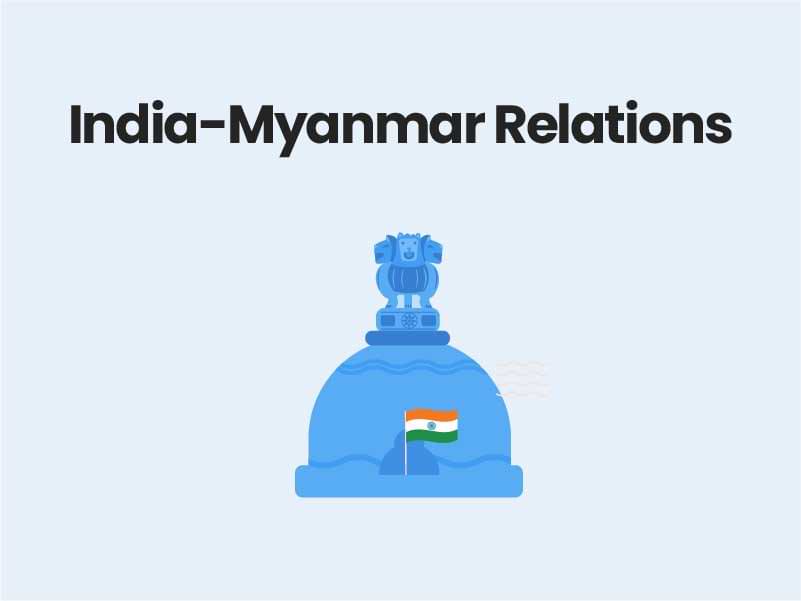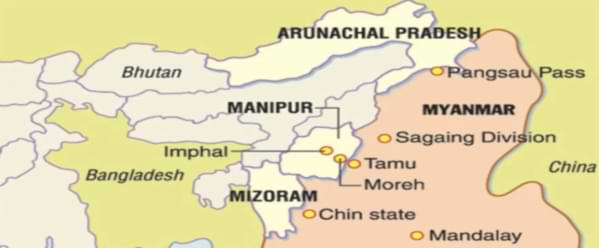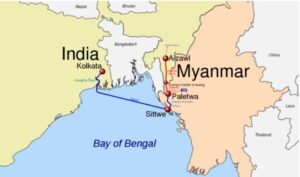Companion@360 → 7 Month programme to sharpen your writing skills → REGISTER NOW

India-Myanmar Relations
India shares a nearly 1600 km long terrestrial border with Myanmar and an extended maritime border also. It shares an international boundary with the Indian states of Mizoram, Nagaland, Manipur, and Arunachal Pradesh. Besides, geographical proximity, the two also share ethnic, religious, and linguistic commonalities.
- The relations between the two neighbours have witnessed many highs and lows.
- Indian leaders also maintained close relations with it during the liberation struggle which was led by Aung San.
- India established diplomatic ties with Myanmar in 1948 after it gained independence.
- The ties however deteriorated after the overthrow of Democracy in Myanmar in 1962 as India condemned the military coup.
Importance of Myanmar:
- Gateway to the East: Myanmar is that the only ASEAN member that shares its borders with India and thus provides an opportunity for deepening ties with south-east Asian nations under the design East and Act East policies.
- Regional Cooperation: Myanmar may be a key component of India s ambitions at bridging South Asia and South-East Asia through BIMSTEC which brings together 21% of the world’s population and features a combined GDP of nearly $2.5 trillion. BIMSTEC also offers an alternate to SAARC which has been held back thanks to strains in Indo- Pakistan ties.
- Security in North East:Cooperation with Myanmar is crucial for controlling insurgency in North-Eastern states. Besides, the porous borders provide fertile grounds for gangland that’s human trafficking, drugs peddling and smuggling of arms and ammunition. These are often checked only with the collaborative effort between India and Myanmar.
- Energy security: Myanmar has rich reserves of oil and natural gas. Since India imports nearly 80% of its fuel, Myanmar is important for India. Myanmar is potentially an important partner in the energy sector as future offshore gas finds can be piped to India. India currently has a JWG on Oil and Gas and JSC & JWG on Power cooperation.
- Food security: Import of pulses and beans from Myanmar is significant in making sure food security in India.
- Counterbalancing China: India must increase its presence in Myanmar so on the counter the growing Chinese dominance within the region. Myanmar thus has strategic significance for India.
Economic Relations:
- India is Burma’s 4th largest trading partner after Thailand, China, and Singapore.
- The bilateral trade stands at approximately US $1.6 billion in 2017-18.
- The agriculture sector dominates the bilateral trade which comprises mostly of pulses and beans imports to India.
- India is additionally the tenth largest investor in Myanmar.
- India has substantial investments in Myanmar’s oil and gas sector.
Infrastructure and Connectivity
- Kaladan multi-modal Highway: It connects Kolkata with Sittwe via sea and Sittwe with Myanmar via Kaladan river, thereby reducing transit time and costs.
- Also under construction is that the India-Myanmar Thailand Trilateral Highway that connects Guwahati in India with Mandalay and Yangoon in Myanmar and eventually culminates in Thailand.
- Disaster relief: India has also assisted Myanmar in humanitarian relief operations following natural calamities like Cyclone Mora (2017), Komen (2015), etc aside from monetary support in rehabilitation and reconstruction.
Defence cooperation
- The two neighbours also conducted joint Army exercises called IMBAX since 2017 and are conducting joint maritime patrols since 2013.
- Indian and Myanmar troops carried out jointly Operation Sunrise and Operation Sunrise 2 in 2019 in their respective territories to destroy several insurgent camps.
- In 2020, India gifted the Myanmar navy its first-ever submarine, a kilo class (INS Sindhuvir) attack submarine which has been refurbished and modernised by Hindustan Shipyard Limited.
Energy Cooperation
- In the context of energy security, India proposed to construct a petroleum refinery in Thanlyn region near Yangon. It would involve an investment of about $ 6 billion.
- India also provides power from Moreh in Manipur to Myanmar.
Rohingya Issue
- India showed diplomatic fine balancing by abstaining from voting against Myanmar during the Bali declaration and also condemned the terrorist attacks in Rakhine district led by ARSA.
Practice Prelims Mock Questions
India Myanmar Relations Challenges
- Rohingya Influx India hosts nearly 40,000 Rohingya Muslims who are denied citizenship in Myanmar and who sought refuge in India so as to flee religious persecution.
- But India faces a tremendous burden on its resources on account of refugees and also apprehends a security threat from radicalized Rohingya youth. As a result, India pushes for the repatriation of refugees back to Myanmar.
- China factor: Growing Chinese presence Myanmar agreed to be a neighbourhood of the Belt and Road Initiative and has also welcomed Chinese investments in various infrastructure projects including port projects like Kyaukpyu port. This has made India apprehensive as a growing Chinese presence in India’s neighbourhood spells strategic concerns.
- Under the China-Myanmar Economic Corridor (CMEC) part of the Belt and Road Initiative (BRI), China is funding and developing many big projects in Myanmar that can be used as military bases in the future.
- China has its own designs and wants to use Myanmar as another base in its ‘string of pearl’ strategy against India.
- Insurgency: The north eastern insurgency group often uses Myanmar as the hiding place. Also the Free Movement Regime causes the influx of new insurgents from the Myanmar Region.
Military Coup in Myanmar – China’s role and impact on India foreign policy
- Recently, Myanmar’s military seized power of the Southeast Asian country in a coup– the third time in the nation’s history since its independence from British rule in 1948
- In a television address, the army announced that power had been handed to the commander-in-chief of the armed forces and that it was declaring a national state of emergency for one year.
- The country’s civilian leader Suu Kyi and several state ministers are being detained in the capital Naypyidaw.
- The move comes after months of increasing friction between the civilian government and the powerful military, known as the Tatmadaw, over alleged election irregularities.
- The two bodies have attempted to share power since the 2015 elections, Myanmar’s first openly contested poll since the end of military rule. That power-sharing relationship now appears to be over following the coup.
Read Full GS Notes



